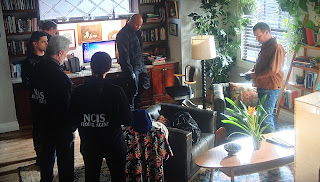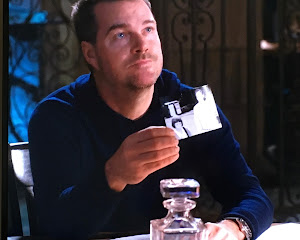NCIS Crossover
!! MAJOR SPOILERS FOLLOW !!
I admit I was skeptical about the crossover, wondering if the writers could get the episodes to flow along a coordinated storyline, and the first two episodes did a very good job. The third episode--the one written by Scott Gemmill--was the weakest link in the crossover which, based on the level of writing for NCIS:LA recently, wasn't a total surprise.
The storyline in part 1 began with the suicide of a retiring FLETC instructor, Dale Harding, and then evolved to include a conspiracy, former CIA operatives, and Simon Williams. The effort to unravel the reason Dale Harding took his own life led the agents to all the other elements of the storyline with several twists and turns, raising more questions rather than providing them with easy answers. In their search, we got to see the agents from the different offices interact and even relive some of their own FLETC experiences. (I couldn't help but think Parker and Callen must've gone through FLETC training first; Parker for the FBI and Callen for the DEA.) There were a few things that didn't work. While Callen and Sam would've questioned McGee, they wouldn't have "arrested" him before questioning him (that he brought up Charlene and Callen's deep fakes was a good touch). When Sam was kidnapped, where was Callen? They didn't go to the airport together? Still, all-in-all, it was a neatly, tightly constructed episode with an ending that led smoothly into part 2.
Part 2 moved the action from DC to Hawaii because that's where Dale was heading after retiring to "meet a friend." Tennant, Sam, and Jimmy were kidnapped and taken to Hawaii by a CIA officer, Melina Delvin, who'd become aware that NCIS was investigating Simon Williams and wanted to know what the agents had found out. This bit was a little too exaggerated in my opinion: the sunglasses, the muscle men, the tough talk. If these are experienced NCIS agents, she should've known they wouldn't be intimidated by any show of force and would likely see through any attempts to trick them. Still, can't blame a girl for trying. Anyway, the kidnapped NCIS folks figure out they're in Hawaii. Back at the NCIS Hawaii headquarters, Parker--who's flown in from DC--takes operational control of the investigation. He's come because this is where Dale was going, and everything leads back to Dale's suicide. Shortly after, CIA Officer Melina #2 shows up at the NCIS Hawaii headquarters and joins the investigation. Ernie identifies a gardener, Norman Dell, who closely resembles Simon Williams, so Parker, Jesse, and Melina #2 head off to question him. Meanwhile, Tennant, Sam, and Palmer overpower their Melina and her muscle men and take them into custody. At the nursery, Melina #2 draws a gun on Jesse before Parker steps in. The standoff ends when Norman shoots at all three, thereby escaping himself and allowing Melina #2 to escape. During the interrogation of the first Melina, Tennant and Sam learn that Melina #2 is CIA, sort of: she was a CIA contractor specializing in covert operations, and her real name is Morgan Miller. Melina identifies a company website Ernie discovers as a CIA clearinghouse for everything that was needed for covert work. The company headquarters is located in Hawaii and Ernie traces Melina #2 using her credit card. Both encounters provide additional details, the most important being the true identity of Simon Williams. A couple of things about this episode didn't quite work. At Morgan's rental house Callen, Kate, and Kai find photos and detailed information about the main NCIS agents in DC, Hawaii, and LA--and this isn't mentioned later in this episode or in part 3. (Also, why is Callen described as being divorced in the note by his photo? His "marriage" to Tracy was for a CIA op and there wouldn't have been any divorce proceedings or official record.) Meanwhile Tennant and Jesse have found Norman, and in his conversation with Tennant he tells her that there are two "Simon Williams" left to testify before Congress about Simon Williams. Callen and Tennant head to L.A. when it's discovered that Kilbride was one of the people Norman was referring to. (I have to admit, that's hard to swallow. First, an admiral is usually someone who's made the Navy his life. If Kilbride was involved with the CIA, the Navy was not his entire career. Sure, he might have had connections to get where he is, but a former CIA assassin--because that was his job with the CIA, not undercover intelligence work like Callen--doesn't seem like the best background for the position of admiral and doesn't jive with some of the comments he's made to a few of the OSP agents and some of their own personal ethics.)
Part 3 was the weakest episode, in my opinion, because it didn't tie up some of the questions raised in the other episodes and it turned into a simple search and rescue. (Also, viewers might not have liked Mosley, but she was the only "boss" of OSP who didn't disappear without a word to the agents until the very end when she had a bounty on her head and was leaving NCIS.) The opening scene between Fatima and Rountree was just cringeworthy. There's a time for comedy in almost every drama, but figuring out when to use it is almost a science, and this wasn't the right time. Here are two federal agents supposed to be searching for their boss who is likely the target of assassins, and they're so focused on their job that they're standing nonchalantly outside his home, trying to figure out what to do, and chatting about hot yoga. And then they casually walk up to the front door. Back at OSP, when Callen and Sam saunter in (from who knows where), they're greeted by Tennant, Torres, and Shyla (the part-time Ops person because OSP doesn't have a fulltime Ops tech) who are talking about the fact that they can't locate Kilbride. When Parker comes down the stairs, he again reminds us--and tells Callen and Sam--that as the SAC of the Hawaii field office, Tennant has jurisdiction over the Pacific Rim. Tennant's "clean your room" comment is pure Gemmill, and that's not meant as a compliment (the comment didn't sound like something Tennant would say imo). Back at Kilbride's, Fatima picks the lock when they get no response, but because she's so focused, she doesn't remember if Shyla sent the security code by text or email. Their conversation, once inside, is vapid and their actions stupid (and we just had a Nancy Drew comment in Sunday's episode). Their boss is missing and his life might be in danger, and Rountree is worried that Kilbride won't like him if he finds out that he entered his house. And there are NO security cameras inside or outside Kilbride's house? And nobody on the entire block has a Ring doorbell? Back at OSP, Tennant states that Kilbride is the only remaining member of Simon Williams (based on the photo, I guess), so he's the only one who can testify that a shadow group has taken over the program. This was confusing because Norm blew up the headquarters of the program in Hawaii, so what was left of the program for the shadow group to use? And, evidently, none of these other agents are trustworthy enough to provide evidence to Congress. During this talk, Parker assumes OSP is under surveillance, but without any evidence. (If OSP is, wouldn't that mean both Hawaii and DC offices were or had been under surveillance?) There are also questions raised about loyalty, specifically Callen's because of his CIA past, but he mentions that Tennant also worked for the CIA. Then it's back to the house and the almost comical way Fatima and Rountree are searching. Rountree mentions that Hetty has a lot of houses under aliases; guess she's been on a buying spree because she sold all of them (except maybe one) in season 9 to pay the ransom for Keane. And then comes the action that makes no sense: Morgan has used subterfuge to get information so far, but in the middle of the day in a residential neighborhood in L.A., where the object is to assassinate a man, that's the time she decides to bring out the BIG guns--and the obligatory slow-mo. If Kilbride wasn't pissed before, he will be now. After this, the episode morphs into a search-and-rescue for Kilbride and Rountree. Nothing subtle about this storyline. There is emotional angst by Fatima who's comforted by Kensi and Deeks. We also learn Shyla has a contact at the CIA and that Sabatino provided some help. (The CIA needs new covers; being inspectors with the Department of Agriculture was used in "Groundwork.") The way Nina Barnes is brought into the story is weak and produces a cringeworthy "comic" moment which wasn't embarrassing only for Deeks.(It's been difficult for NCIS:LA writers to sustain a sense of urgency or seriousness in episodes lately, and this episode written by the showrunner offers some explanation.) When the dark web page showing the agents comes up, my first thought was there better be some information for the guys trying to earn the bounty when they click on the photos because the agents' names aren't going to be much help finding individual agents in an agency with thousands of agents stationed around the world. And, yea, Parker wants the NSA and cyber to shut the site down, but the internet is forever, and Gemmill offered no resolution to this. Was that intentional, or did he just drop it? And then there's the voice message which Callen barely recognizes. The whole actor thing was something of a stretch and so convenient that he just happened to live in L.A. The Rountree beating scenes slowed down what pace the episode had, and had no real purpose other than to demonstrate his stamina and draw out the rescue. And the ending was completely lacking in logic or believable action. Morgan is searching for Kilbride, who's in L.A., so she sets up her base of operations more than 100 miles and almost a 2-hour drive--on a good day--from downtown L.A. This makes zero sense when she has a multitude of warehouses and abandoned buildings in more than 100 square miles to choose from. The ending also included the obligatory firefight and a dramatic reunion between Fatima and Rountree. But the most unbelievable part of the ending was Kilbride. We're asked to believe that Kilbride followed the NCIS agents for 100+ miles--unseen by any of them--on their drive to Mojave (which doesn't say much for their observational skills), parked out of sight, put on his ghillie suit, grabbed his sniper rifle, and then positioned himself perfectly to get the shot off that killed Morgan. Makes me wonder why Kensi takes any time setting up when she is the team sniper.
The NCIS agents from the different shows worked really well together. It would be great to see them working together again. I still have a few questions, the primary one being was Morgan the head of the "shadow organization" that usurped the "Simon Williams" program or just an employee? Who in the CIA was feeding Morgan information? Maybe we'll never know. Overall, the crossover was a success. I just wish part 3 had been more connected to parts 1 & 2.



Comments
Post a Comment